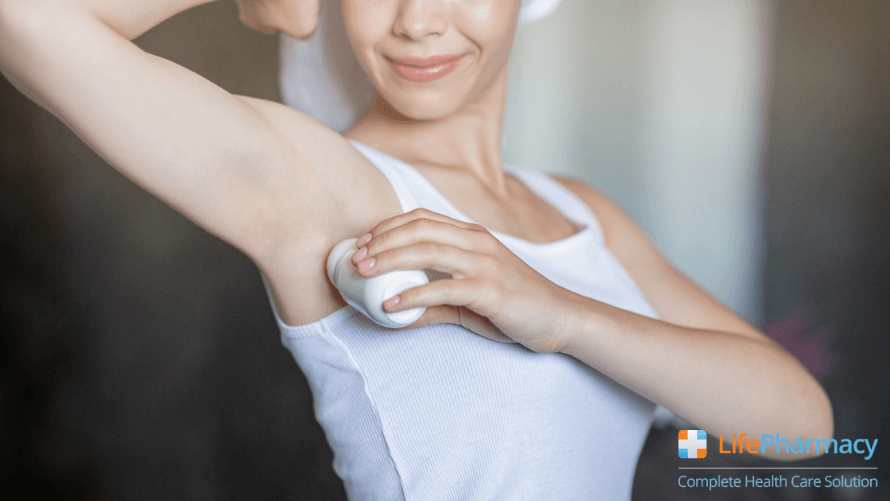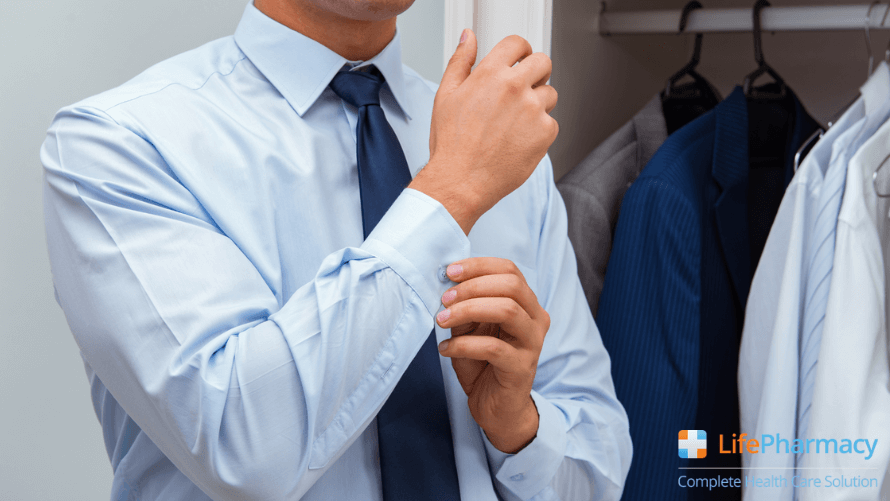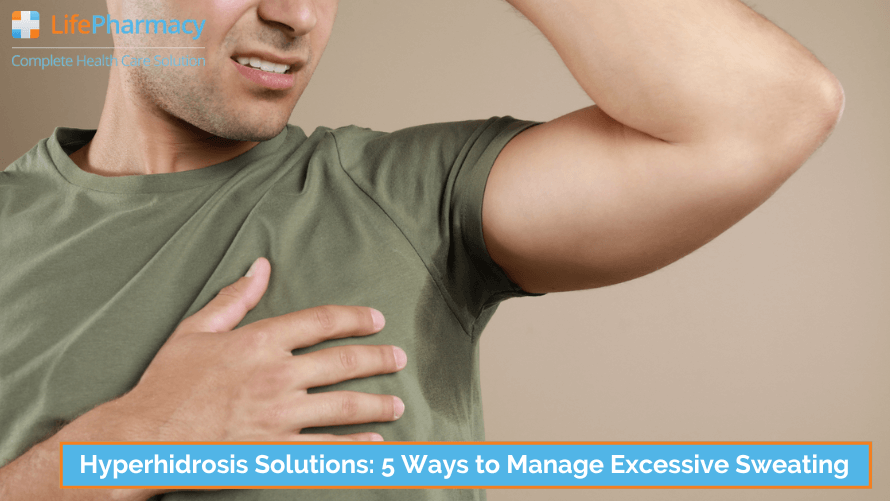Whether it's a firm handshake that leaves you both damp-palmed or a job interview that becomes uncomfortably moist, dealing with excessive perspiration can be a challenge.
In this guide, Online Pharmacy UK explores effective strategies to combat excessive sweating and help you regain your self-assured composure.
What is Hyperhidrosis?
Sweating is a natural cooling mechanism. Sweat glands release moisture on our skin when our bodies heat up, whether due to the weather or physical exertion. As this liquid evaporates, it cools us down. However, for some individuals, sweating becomes more than just a natural response to heat. This condition, known as hyperhidrosis, involves abnormal and excessive sweating that's not linked to temperature or activity.
Hyperhidrosis often stems from overactive nerves that trigger sweat glands, causing perspiration to flow uncontrollably. Additionally, secondary hyperhidrosis can result from underlying medical issues like diabetes, menopause, infections, nervous system disorders, or thyroid problems.
How do you fix excessive sweating and hyperhidrosis?
Steps to combat excessive sweating problems:
-
Mastering Antiperspirant Application

Excessive perspiration can be a real challenge. To conquer this issue, it's essential to understand the difference between fragrances like deodorants and antiperspirants. While deodorants mask odor, antiperspirants are the true sweat warriors, blocking those sweat ducts and keeping you dry.
Antiperspirants are topical products armed with ingredients like zinc and aluminum, which act as formidable barriers against sweat gland activation. They don't just cover up the smell; they stop the sweat at its source. Here are a few key points you need to remember for antiperspirant application:
-
Nighttime Application
When it comes to antiperspirants, timing is everything. Applying them at night before bed is a game-changer. As your body temperature drops during sleep and your activity level decreases, your sweat glands become less active, providing the ideal conditions for antiperspirants to form a barrier effectively. Ensure your sleeping environment is cool for optimal results.
Running low on antiperspirant?
Secure your supplies today from the trusted online pharmacy, Life Pharmacy UK.
-
Clean and Dry Skin
Your skin should be clean and dry for antiperspirants to work their magic. Even the slightest residue from deodorants can hinder their effectiveness. To maximize results, shower and thoroughly dry your skin before applying antiperspirants. Besides countering excessive sweating products, using effective skin care products is pivotal to flaunting radiant and glowing skin.
-
Hair Matters
Effective antiperspirant application relies on good skin contact, and excessive body hair can be a hindrance. Consider trimming or shaving the underarm area for better results. However, avoid applying antiperspirant immediately after shaving to prevent irritation.
-
Persistence Pays Off
Sometimes, sweat control is not achieved after a single application. Don't be discouraged; it may take a few consecutive applications to rein in perspiration fully.
Choosing the right antiperspirant is key in your quest to conquer excessive sweating. Look for clinical-strength antiperspirants with higher levels of aluminum salt, like Aluminum Chloride, for effective sweat control.
-
The Diet Secret to Staying Dry

Your diet can influence not only your health but also your propensity to sweat. Some foods have the uncanny ability to make you sweat more, while others can help you stay cool and collected. Online chemists are here to spill the beans on how to master the art of staying dry with a healthy diet rich in vitamins and supplements.
-
The Spicy Dilemma
Spicy foods, like chili or hot peppers, can set your body's internal temperature soaring. As your body processes the heat, your heart rate increases, leading to—you guessed it—more sweat. So, if you're looking to avoid those telltale signs of sweat, it might be best to steer clear of the spice. Spicy foods wreak havoc on your digestive system as well; you can order your supplies of stomach and digestive care supplements from the online pharmacist to ward off any issues.
-
Beware of the Fatty, Processed Temptations
Those irresistibly packaged sausages and fatty processed foods may taste divine, but they come at a cost. Your body has to work overtime to process these fatty indulgences, potentially raising your internal temperature and prompting more sweating.
-
The Salty Snack Trap
Indulging in very salty foods, like potato chips, can lead to your body's attempt to process the excess salt through—you guessed it again—sweating.
The good news is that you can make strategic dietary choices to minimize unwanted sweating. Opt for a diet rich in fruits and vegetables, as they contain plenty of water to help keep you cool and reduce the need for your body to sweat. You can navigate towards herbal remedies to fill in your vitamins and supplements requirements if your diet is deficient in these essentials crucial to your well-being.
Fruits and Veggies for a cooler you:
-
Cucumbers
-
Celery
-
Watermelon
-
Spinach
-
Lettuce
-
Grapefruit
-
Bell Peppers
-
Olive Oil
-
Staying Cool Works
When the heat is on and sweat threatens to steal your composure, it's time to take charge of the situation.
Here are a few secrets to staying cool and sweat-free in scorching temperatures:
-
Beat the Sun
Draw blinds and curtains to block out the sun's scorching rays. Keep the temperature down and the sweat at bay. When outdoors, avoid strenuous activities in the blazing heat and find a cool relaxing spot. Large hats provide valuable shade for your face, helping you stay cool even under the sun's relentless gaze.
-
Chill the Air
Place a bowl of ice in front of your fan or air conditioner for an extra blast of coolness. It's a game-changer for staying comfortably dry indoors.
-
Cool Showers
Take a refreshing cool bath or shower to lower your body temperature and bid farewell to sweat.
-
Hydration
Stay well-hydrated to keep your body temperature in check. Water not only keeps you alive but also helps reduce the need to sweat excessively.
-
Dress Smart To Stay Dry

Your wardrobe plays a crucial role in the battle against excessive sweating. You can step out confidently with the right fabrics, colors, and layering, knowing your clothing will keep perspiration in check.
-
The Breathable Fabric Advantage
Choosing the right fabrics is your first line of defense. Opt for lightweight, breathable cotton, linen, and moisture-wicking fabrics. They allow air to circulate, keeping you cool and minimizing sweat buildup on your clothes.
-
The Impact of Color and Pattern
Believe it or not, your clothing color matters. Lighter colors, especially white, reflect sunlight and reduce visible sweat stains. Avoid light blues, grays, and bright colors that highlight perspiration. Instead, opt for dark colors and patterns that camouflage sweat mishaps.
-
Advanced Solutions for Excessive Sweating
If you find yourself constantly battling excessive sweating, it's essential to consult a healthcare professional. There might be underlying causes contributing to your condition.
Here are some medical treatments to consider:
-
Topical Creams
Your doctor may prescribe topical creams containing glycopyrrolate, especially for excessive sweating on the face.
-
Prescription Antiperspirants
These are stronger than over-the-counter options, often containing higher levels of aluminum chloride. For effective hyperhidrosis treatment, consult your doctor for expert advice.
-
Botox Injections
Botox temporarily blocks the nerves responsible for sweating, offering relief lasting six to twelve months.
-
Oral Medication
Certain medications can block the chemical signals between nerves, reducing sweating. Be aware of potential side effects and consult your doctor for guidance.
-
Surgical Options
Surgical interventions are available in extreme cases, including sweat gland removal and nerve surgery.
When all the strategies fail to keep your sweat at bay, it's time to explore more advanced options. Excessive sweating can be a persistent challenge, but modern medicine offers a range of treatments that can help you stay dry.
Here are a few to consider:
-
miraDry
This non-invasive procedure uses electromagnetic energy to eliminate sweat glands, offering long-lasting results.
-
Iontophoresis
An electrical treatment for sweating on hands and feet, where medication is delivered through the skin via electrical currents.
-
Endoscopic Thoracic Sympathectomy
A more invasive option involving the destruction of nerve endings associated with overactive sweat glands.
-
Curettage for Underarm Hyperhidrosis
This treatment involves scraping and vacuuming out sweat glands in the armpit area.
Conclusion
Managing excessive sweating may take time, but numerous solutions are available. Once you find what works for you, you can regain confidence and face situations without worrying about sweat. Remember, while sweating is natural, unexplained or excessive sweating should be discussed with a doctor, as it could signal an underlying medical issue.
Are you tired of battling the relentless annoyance of sweat? Look no further, because Life Pharmacy UK is your trusted ally in the fight against perspiration! We've got the weapons you need to stay dry and confident all day long.
Like sweating, the summer months can aggravate acne problems; knowing how to prevent summertime acne and keep your skin flawless all year round is important.






